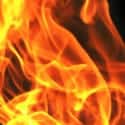
Parashat Shemini – Coming too close
I often find myself feeling physically ill and sad when I get to this parasha – it is hard to even turn the page from Chapter 9 to Chapter 10 – from the scene of God’s Presence appearing to light the altar for the first time, to the scene of the death of Aaron’s sons, who bring “alien” fire to the Tabernacle.
Shemini means “8th,” as in the eighth day after the consecration of the Tabernacle, and all of this drama occurs on this day. Now the first sacrifice is going to be offered on the altar and the people will “see” the Presence of YHVH. Aaron brings the various offerings that are commanded, all according to regulation. He blesses the people. Then he and Moses go into the Tabernacle and come back out and bless the people again. The Presence of the Lord then, amazingly, appears to all the people and a fire comes forth from God and consumes the offerings.
But tragedy occurs in the very next moment, when two of Aaron’s sons, Nadav and Avihu, bring “alien fire” before God and that same fire that had come forth from God consumes them. Aaron is silent.
The last chapter of the parasha is one of the sections in Torah that outline the animals we are forbidden from eating.
In this week’s haftarah, from II Samuel, we also see this theme of the realm of the sacred having dangerous properties. In it, King David transports the Ark of the covenant to Jerusalem, to establish a permanent home for it there. But on the way, the Ark seems to be wobbling, and Uzziah reaches out to stabilize it. He is struck down dead instantly.
So may questions…too many… What does it mean the that people actually “see” the Presence? The commentators go to great lengths to explain this away – they must have just seen the fire, or the cloud, they say. And how are we to understand the deaths of Aaron’s sons, whose names, by the way, mean “willing” and “God is my Father”? Again, the commentators try to explain it in various ways, and we’ll see if any of their explanations can be even remotely satisfying. And how are the laws of Kashrut connected to this incident?





